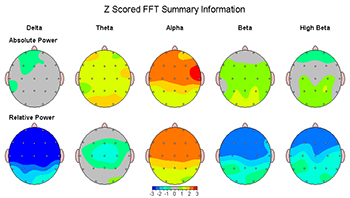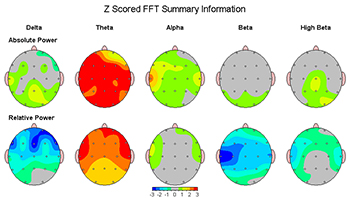Depression Treatment Program in Scottsdale, AZ
Serving the entire state of Arizona
A successful and alternative treatment for Depression
The Scottsdale Neurofeedback Institute here in Arizona has been using an alternative treatment known as QEEG brain map based EEG Neurofeedback in concert with other therapies to successively treat depression for over twenty-eight years.
The Effects of Depression
Depression is a debilitating mental health issue that affects millions of adults worldwide and can severely impact a person’s quality of life. At Scottsdale Neurofeedback Institute, we recognize the detrimental effects of depression on individuals and their loved ones.
Depression can cause a variety of symptoms, such as loss of interest in previously enjoyed activities, feelings of worthlessness, and changes in appetite, sleep patterns, and concentration. These symptoms can interfere with work, relationships, and overall daily functioning. We design our depression treatment program to help individuals overcome their symptoms and achieve a better quality of life.
At Scottsdale Neurofeedback Institute, we utilize advanced strategies to deliver personalized, effective depression treatment to those in Scottsdale, AZ. We believe that every individual experiencing depression deserves expert and compassionate care. Our team of experienced clinicians delivers evidence-based treatments in a warm and friendly environment, ensuring that each patient receives the individualized and personalized attention they deserve.
Depression is a debilitating illness, causing one to feel a constant sense of sadness. Research has found that an estimated 1 in 10 U.S. adults report feeling depressed.
Common symptoms of depression in adults are as follows:
|
|
|
|
|
|
|
|
|
|
|
|
|
In younger children and adolescents, depression can present differently. Common symptoms of depression in younger children could include sadness, social withdrawal, clinging, irritability and fearfulness is a behavior problem. In teens and adolescents symptoms of depression can include anger, anxiety, oppositionality, behavior problems, not wanting to interact socially, and changes in sleep patterns.
QEEG Brain Mapping Research for Depression
At the Scottsdale Neurofeedback Institute we have researched the relationship between depression and electrical activity in the brain. Utilizing QEEG Topographic Brain Maps made it possible to examine a patient’s brain electrical activity (which correlates with blood flow, metabolism and neurotransmitters). By comparing a patient’s EEG to norms from six QEEG normative data bases (including the New York University QEEG Database) statistically significant abnormalities were determined. We looked at the brain maps of over a thousand individuals who met diagnostic criteria for major depressive disorder. We found there are twelve subtypes of depression.
The most common is elevated central Alpha (8 – 12 Hz). Further research has shown this subtype is most likely to respond to SSRI type medications like Prozac.
Elevated Alpha Depression Subtype QEEG Brain Maps
Elevated Alpha Depression Subtype QEEG Brain Maps
Research has shown that elevated central Theta (4 – 8 Hz) is most likely to respond to Wellbutrin.
However, not all respond like these two subtypes and/or develop unacceptable side effects. Patients with the other ten subtypes are much less likely to respond to antidepressants.
All twelve subtypes have usually been responsive to EEG Neurofeedback. The majority of patients can change their brainwaves in the necessary direction and the depressive symptoms are reduced as the brainwaves move toward normal. The improvements are usually lasting.
Since there are twelve subtypes we have found it necessary to utilize six normative QEEG databases so that we can train with great specificity and accuracy.
For more information, or to schedule an appointment, call us on 480-625-4123
Neurofeedback, a primary treatment for Depression
With QEEG based neurofeedback, aberrant areas of the brain as determined by a QEEG brain map, can gradually be trained back toward normal. This correlates with observable and measurable improvements in functioning. Neurofeedback works by utilizing real-time displays of electroencephalography (EEG) to illustrate brain activity and teach self-regulation. More information about Neurofeedback can be found here.
For more information, or to schedule an appointment, call us on 480-625-4123

